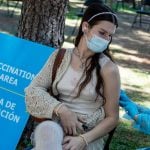Aziza Ahmed describes it as a public health disaster: a lot of people in tight quarters, inadequate health care, staff coming and going and no vaccines.
Ahmed is a professor of law and an expert in health legal issues at Boston University. She is among a chorus of public health experts voicing concerns over the federal response to monkeypox in prisons and jails.
“At least at a minimum, [monkeypox] will require vaccines and personal protective equipment and places to isolate or quarantine,” Ahmed said. “Vaccines are really the baseline.”
Last month, the Biden administration declared the monkeypox virus — which is primarily spread by skin-to-skin contact — a public health emergency. While anyone can get and transmit the virus, it has thus far disproportionately impacted men who have sex with men. Experts say that is also likely to be the case behind bars, where thousands are crowded into tight facilities and sex is often traded for safety, and in many cases prisoners in laundry facilities must wash each other’s bedding and clothing.
But the Biden administration has no plans to administer or require vaccines to prevent the spread of monkeypox behind bars, officials confirmed to The 19th.
In an email to The 19th, Randilee Giamusso of the Federal Bureau of Prisons (BOP) said that due to limited supplies, federal prisons will not vaccinate the incarcerated unless they are already exposed to monkeypox. The Department of Justice declined to comment on any plans to enforce vaccine access in state prisons or county jails, stating only that whether incarcerated people got them would be left as a matter of personal choice.
“BOP health care staff continue to monitor inmate patients for signs of monkeypox infection and are prepared to offer vaccination as clinically indicated by current CDC guidelines,” Giamusso said.
As of August 10, federal prisons had not reported any monkeypox cases. Cook County Jail in Chicago — one of the country’s largest single-site jails — reported its first case at the end of July.
Vaccinating people who have been exposed to monkeypox is effective in preventing them from experiencing symptoms and spreading the virus, said Dr. Joshua Barocas, associate professor of medicine and infectious diseases physician at the University of Colorado School of Medicine.
“But this is a conditional situation in which you know that you’ve been exposed,” Barocas added. “If you’re in a jail or prison setting, in close contact, sharing bedding, you might be cleaning somebody else’s bedding, sharing utensils, and certainly there is sexual activity happening in jails and prisons. By not being proactive in this community, we’re ignoring a potentially high-risk venue for spread.”
While fabric-to-skin contact is generally considered low risk for spreading monkeypox, experts worry that chances of contagion could increase in prisons, where incarcerated people must wash hundreds or thousands of sheets.
It remains unclear what, if any, vaccine supply will be made available to those in federal and state prisons and county jails. Supplies of the monkeypox vaccine remain limited, and priority in most parts of the country has gone to those considered highest risk for infection: queer men, men who have sex with men, trans and nonbinary people who have had multiple partners, anonymous sexual partners, or both in recent weeks.
Health experts told The 19th that offering vaccines inside prisons helps the incarcerated, those employed in prisons and the general public. Last year, Drs. Eric Reinhart and Daniel Chen found that 13 percent of Chicago’s COVID-19 cases from March 2020, when the pandemic first struck there, could be traced back to Cook County Jail.
Reinhart, who is a physician and anthropologist at Harvard and Northwestern Universities, argues that prisons and jails are powder kegs for pandemics.
“Ultimately, this doesn’t just affect incarcerated people who deserve care and attention and proper preventative measures, but it also affects broader populations,” they said. “Mass incarceration is fundamentally incompatible with public health and it doesn’t just put people who are incarcerated at risk, it puts the entire U.S. population at risk.”
On August 4, the Centers for Disease Control and Prevention published monkeypox guidance for prisons and jails that recommends frequent hand washing, isolation of people who are infected and proper waste disposal to curb the spread of the virus. Absent from the list are mentions of vaccines. Experts also question the feasibility of social distancing in prisons and jails.
Barocas added that the guidance lacks testing and screening protocols.
“You may not even know if your cellmate has monkeypox,” Barocas said. “They may not disclose because of fear of repercussions by jail or prison staff.”
While some have voiced concerns about mutations of the virus in prisons, Barocas said the greatest threat behind prison walls is simply rapid spread.
“If you let it go unmitigated because of some ridiculous notion that people in jails don’t deserve the same treatment as people out of jails, then you’re going to get unmitigated spread in the community,” he said. “These are literally incubators for the community.”







